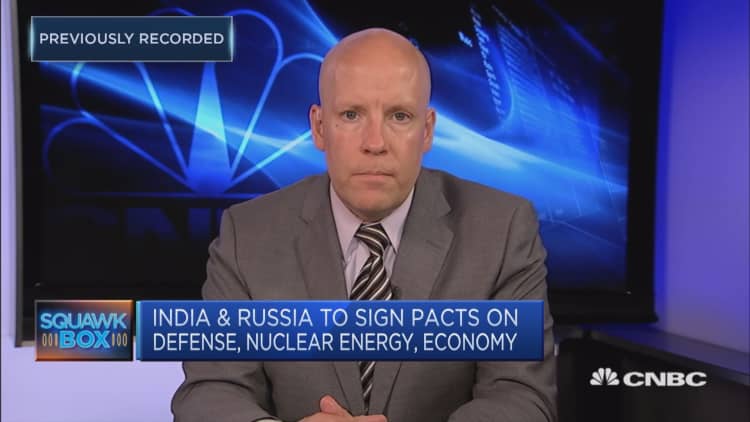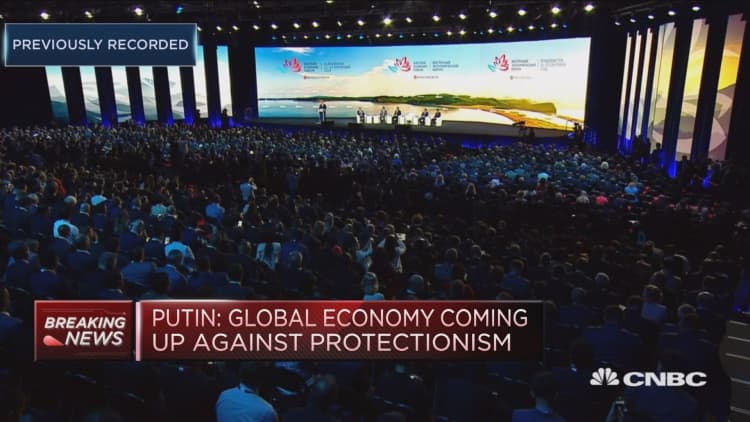India signed a $5 billion purchase of advanced missile technology from Russia on Friday, a deal seen as New Delhi's response to China's growing influence in the Indian Ocean.
Russian President Vladimir Putin arrived in New Delhi Thursday to meet Indian Prime Minister Narendra Modi for an annual bilateral summit that's has focused on energy, security and defense issues.
Of particular interest is India's purchase of the Russian-built S-400 Triumf, a long-range surface-to-air missile system capable of destroying both cruise and ballistic missiles.
The order, which has been under discussion since 2015, was finalized on Friday afternoon according to several news agencies who cited both Indian and Russian officials.
The deal is a signal that the Modi administration is "trying to take steps to counter China," said Richard Rossow, a senior advisor at the Center for Strategic and International Studies, who specializes on U.S.-India relations. He believes that India wants high-end defense equipment for power projection in the Indian Ocean, where Beijing has been growing increasingly assertive.
From Tanzania to Sri Lanka, the two Asian heavyweights have been competing to establish a stronger military and economic presence in countries along the massive waterway. Since China launched its first overseas military base in Djibouti last year, Modi's government has secured access to naval facilities in Indonesia, Iran, Oman and the Seychelles.
"The S-400 range would enable India to track aircraft beyond its borders, making it a valuable asset as the People's Liberation Army Air Force extends its training and deployments closer to Indian territory," said Zoe Stanley Lockman, an associate research fellow specializing in defense at Singapore-based Nanyang Technological University.
There are other reasons behind Modi's interest in the S-400 system.

"China is certainly a motivating factor — not only because of Chinese assertiveness in the Indian Ocean, but also because Beijing supplies about 70 percent of the weapons imported by Pakistan," said Lockman.
"The S-400 Triumf is far superior to the Chinese-supplied Pakistani surface-to-air missile defense systems," Lockman said, adding that acquisition of the S-400 would be a way for India to counter Pakistan's advances in nuclear technology.
New Delhi's concerns about close ties between China and Russia could also be a factor, according to Rajeswari Pillai Rajagopalan, head of the nuclear and space policy initiative at the Observer Research Foundation.
The world's second largest economy was the first overseas buyer of Russia's S-400 and Su-35 fighter jet. Beijing also purchased numerous Russian submarines in recent years.
Those purchases put India's security at some risk and illustrate an important shift in Russia-China security dynamics, Rajagopalan said in a Thursday note. "Beijing for a long time was not given access to the best and most modern Russian technology and there was no technology transfer," she pointed out.
Risk of sanctions
Analysts have warned that New Delhi runs the risk of getting hit with U.S. sanctions if it pushes ahead with the S-400 purchase.

Countries doing business with Russia's defense and intelligence sectors could face the risk of automatic penalties under a U.S. law called Countering America's Adversaries Through Sanctions Act (CAATSA) that President Donald Trump enacted last year. Last month, Washington imposed sanctions on China's military for purchasing Russian weapons. And on Thursday, U.S. Army General Joseph Votel criticized Russian deployment of the S-300 in Syria.
India, however, could be exempted from punishment.
"The ability to give waivers was widened by Congress, specifically with India in mind," Rossow said: "The Trump administration made a pitch on a number of occasions to (Capitol) Hill, trying to make sure there was a little bit more space to offer waivers to countries and India was often named in that."
Asian security is a defining characteristic of the U.S.-India relationship, with New Delhi a major player in the U.S. Indo-Pacific initiative —a program that aims to offset rising Chinese influence in the region.
"Washington has been somewhat understanding because India over the last few years has diversified its defense procurement and reduced its dependency on Russia to some extent, which is one of the conditions for gaining a CAATSA waiver," said Rajagopalan.
Also announced by the two countries is an agreement to develop six nuclear power plants in India. Putin and Modi have also agreed to cooperate on India's plan to launch a manned space mission.

